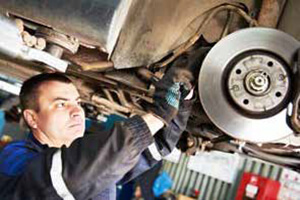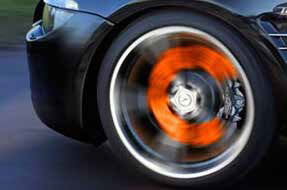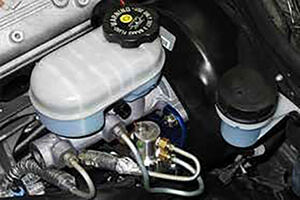CAIRNS BRAKE & ABS SERVICING
& REPAIRS
BRAKES ARE THE MOST IMPORTANT SAFETY SYSTEM ON YOUR CAR OR VEHICLE!
Whether you drive a Lamborghini or a Hyundai stopping your vehicle safely is the most important aspect to driving. It all comes down to a combination of speed, driver skill, wheels, tyres, road surface, conditions and most importantly…brakes. We are not here to tell you how to drive your car, or on what surfaces, speeds or conditions as we are not experts in these fields any more than the next person. We are however experts when it comes to brakes and braking systems on your car or vehicle.
Your brakes are made up of several important components. The ABS (Anti-lock Brake System), is an integrated computer controlled safety system that grips and releases the brakes to ensure that your wheels do not lock up so you can maintain direction and steering control under heavy braking. For the brakes themselves, we can start at the brake pads, which can have various compositions depending on the vehicle and the type of performance required. Then there is the disc or rotor, which is a smooth machined metal disc that the brake pads are forced against in order to stop the vehicle. The disc is responsible for not only providing the gripping surface but also heat dissipation. Then we have the hydraulic system which contains the brake booster, master cylinder, combination valve, hydraulic lines, wheel cylinders and calipers. Pretty much all the parts that work together with your brake fluid to squeeze the pads onto the discs via the calipers. Lastly we have the hand brake, which is usually a manual cable applied brake to the rear wheels. Please note that your pads are a consumable product and every time you apply the brakes your brake pads will wear out a little.
DOES YOUR CAR NEED IT’S BRAKES OR ABS CHECKED?
If you notice any of the following then it is important to get your brakes checked!
- Spongy or soft brake pedal
This means there’s air in the brake system either as a result of improper bleeding, fluid loss or a very low fluid level. The cure is to bleed the brakes correctly. Another possible cause is a rubber hose that is “ballooning” when the brakes are applied.
- Your brake fluid is low
This usually indicates a leak in the brake system which poses a serious safety hazard. All aspects of your hydraulic system need to be inspected. If a leak is found, the defective component must be replaced or rebuilt. Please note that it is important not to drive the vehicle until repaired as a leak may lead to brake failure.
- Excessive brake pedal movement
Possible causes include worn brake linings, misadjusted drum brakes, and air in the brake lines. Potentially dangerous because the system may run out of pedal before the vehicle can be safely stopped.
- Grinding noises when you apply the brakes
A sign of metal to metal contact, which can be caused by your brake pads wearing out and the calipers are grinding away at the discs when you apply the brakes. Drum and rotor replacements will likely be needed in addition to new linings and brake hardware. For this reason it is always best to change your brake pads before they wear down completely.
- Your brakes are getting too hot and you are experiencing brake fade
Brake fade occurs most often during high performance driving or when going down a long, steep hill. It is caused by excessive heat build up in the rotor or the brake fluid. If it is the rotor then you will notice that the brakes are still firm but you will have reduced stopping power. If it is caused by the brake fluid boiling, the brake pedal feels “spongy” and you will have reduced stopping power. This condition is worsened when there are contaminants in the fluid, such as water, which most types of brake fluids are prone to absorbing to varying degrees. For this reason brake fluid replacement is standard maintenance.
- Squealing noises when you apply the brakes
Commonly caused by vibrations between the disc pads and caliper, which can be cured by resurfacing or replacing the rotors, installing new pads or applying noise compound to the backs of the pads.
- What is the ABS warning light on your dash?
If there is any kind of problem with your ABS it will show a warning light on your dash. Please take heed of this warning and take your car into a mechanic to get it looked at. While the ABS is not used in every day braking or stopping, it is very important in emergency conditions and may enable you to steer your way out of a serious situation whilst stopping you quickly.
- What is the brake warning light on your dash?
The brake warning light is connected to your braking system and will light up if there is any issue with your brakes sticking or still being applied after the brake pedal is released. Please note that it will also show up if you have left your hand brake on (even just a tiny bit) so you should always check your hand brake first and ensure it is released properly. If the light stays on and the hand brake is properly disengaged, then take your car to a mechanic immediately as it could be a sign of imminent brake failure.
- When you pull on the hand brake very little happens or the car still moves
Hand brakes are a simple system that requires adjustment from time to time. If your brake pads are worn down you may need to have your hand brake cable tightened as they will need to move just that little extra to have a tight grip on the wheel.
OUR BRAKE SYSTEM SERVICE
Get on top of any problems before they arise.
We not only repair brakes and braking systems when they breakdown but perform maintenance and servicing to ensure safety and longevity of these important components. It is always best to maintain any safety systems to avoid catastrophic failure instead of waiting for them to fail.
What’s included with our full brake service?
- Check fluid level & condition
This is particularly important with brakes as the contaminants in the brake fluid and any water buildup will cause performance loss under high temperatures known as brake fade.
- Check and replace brake pads
This is pretty straight forward as you need pads to stop your car without grinding your rotors away. Pads that have completely worn away will have greatly reduced stopping power and can cause serious and expensive damage to your vehicle.
- Rotor or disc check
We will check the rotors (also known as discs) for cracks and issues. We can machine them if necessary. Generally a good idea to machine when replacing the brake pads.
- Hydraulics check
This is in conjunction with the fluid test, to see if there are any leaks, that the pressure is maintained throughout the system and that there are no air pockets or inconsistencies in braking.
- Caliper check
The calipers are responsible for applying the pads to the rotors and as such are the final part of the hydraulic and mechanical system. We need to check that they are aligned properly so your brakes apply evenly and that there are no shudders or vibrations.
- ABS systems check
We need to check the application of the system and that it is functioning properly so your brakes won’t lock up on you when you need them the most and you can steer out of trouble.
HOW MUCH DOES IT COST?
Costs for brake systems can be expensive, especially if you leave it until things are well past their replacement period. However, the earlier you check and keep on top of them the cheaper they are in the long run. Brake checks are included with every service, but replacement of pads etc is not. Our pricing is simply our hourly rate plus parts. We will give you a quote before we start any work so you know your costs up front.



